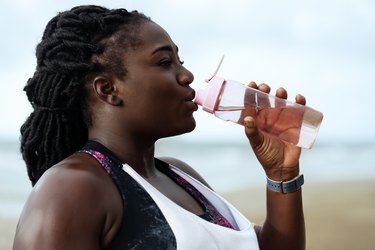
Water is essential for life, as it plays a vital role in every part of your body. However, it doesn't necessarily matter if you're drinking 32 ounces of water at a time — it's just important that you're drinking enough water on a daily basis.
Don't focus on how much water you're drinking in one sitting. Instead, drink enough water gradually throughout the day so that you're not thirsty and you have pale yellow or clear-colored urine.
Video of the Day
Video of the Day
Drinking Water for Optimum Hydration
The National Academies of Sciences, Engineering and Medicine sets a general recommendation for water at 2.7 liters, or 91 ounces, of water per day for women and 3.7 liters, or 125 ounces, per day for men. However, only about 80 percent of that water is likely to come from water and other beverages, while the remaining 20 percent comes from water-rich foods. Even beverages that contain caffeine or alcohol contribute to your daily water intake, according to Harvard Health Publishing, even if they are also slightly dehydrating because they make you urinate.
Read more: How Can I Tell When My Body is Hydrated?
There's a long-standing recommendation to drink eight 8-ounce glasses of water a day, but that's more or less a myth, says the University of Michigan Health. People have varying needs for water, based on gender, size, activity level and the weather outside, notes Harvard. Instead of aiming for a specific amount of water in one sitting or a certain number of glasses of water a day, drink enough water to fulfill your thirst.
The color of your urine can be a good indication of how hydrated your body is, too. The more water you drink, the clearer your urine is, notes the Urology Care Foundation. The ideal urine color is pale yellow or clear, while dark yellow or brown urine indicates that you aren't drinking enough water — and that's a risk factor for kidney stones.
Dehydration can be severe enough to be life-threatening, says the U.S. National Library of Medicine, so watch out for the signs: excessive thirst, dry mouth, dark urine, dry skin, fatigue and dizziness. If symptoms include confusion, fainting or rapid heartbeat, get immediate medical care.
Water Intoxication Symptoms
Believe it or not, there are disadvantages of drinking too much water at one time. According to the Mayo Clinic, the condition known as hyponatremia occurs when the concentration of sodium in your blood gets too low, and one potential cause is drinking too much water. Symptoms of drinking too much water or water intoxication include nausea, vomiting, headache, fatigue, muscle cramps and confusion; the condition can also lead to seizures, coma and even death.
Too much water isn't the only cause of hyponatremia, so it's important to see a doctor if you're experiencing water intoxication symptoms. However, if you suspect that water is the culprit, you should take measures to cut back. The Mayo Clinic recommends letting both thirst and the color of your urine be the guiding measure as to how much water you drink, and occasionally drinking an electrolyte-rich beverage instead of water when participating in endurance activities such as triathlons or long-distance runs.
- National Academies of Sciences, Engineering and Medicine: "Dietary Reference Intakes: Water, Potassium, Sodium, Chloride, and Sulfate"
- Mayo Clinic: "Hyponatremia"
- University of Michigan Health: "Myth Busting: No More 8 Glasses a Day"
- Urology Care Foundation: "The Meaning Behind the Color of Urine"
- U.S. National Library of Medicine: "Deydration"
- Harvard Health Publishing: "How Much Water Should You Drink?"